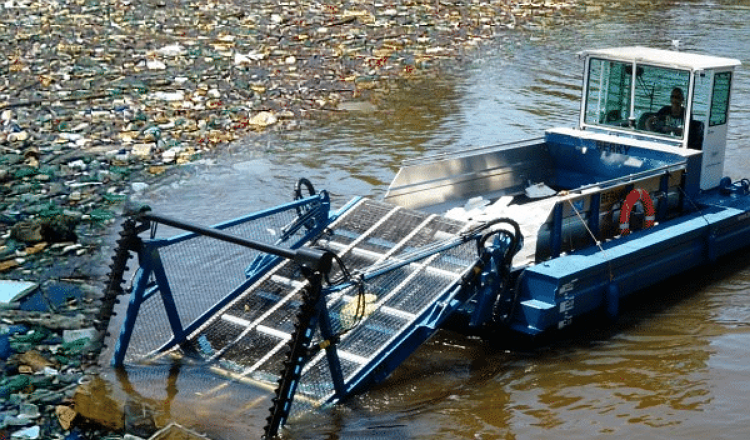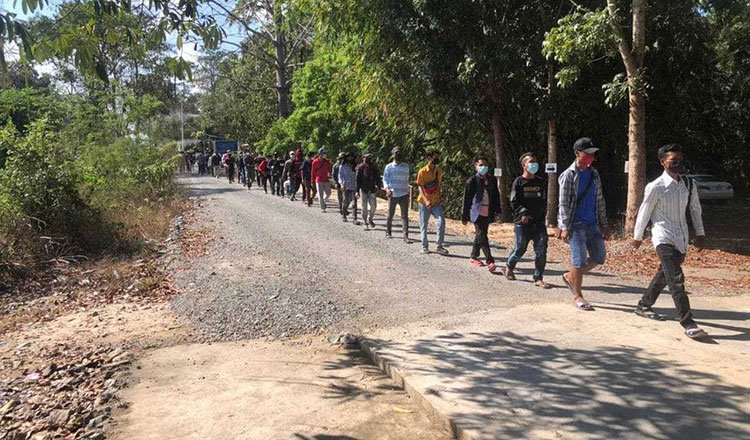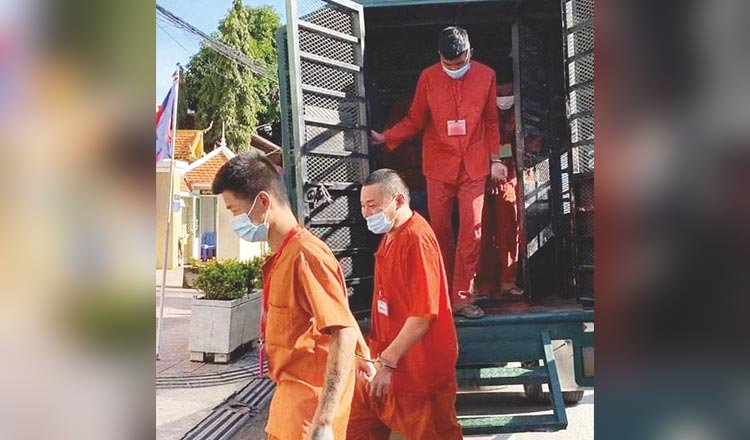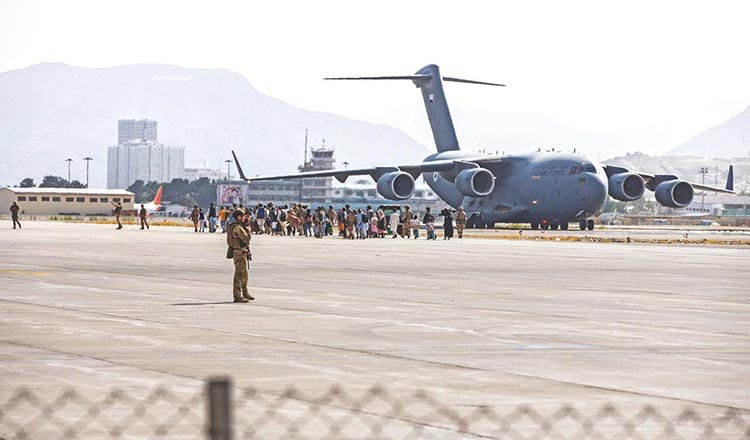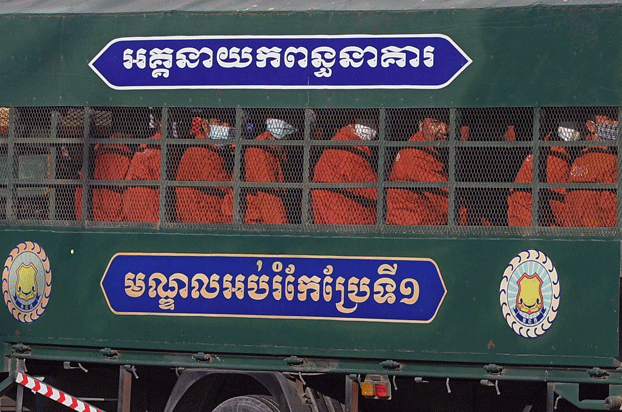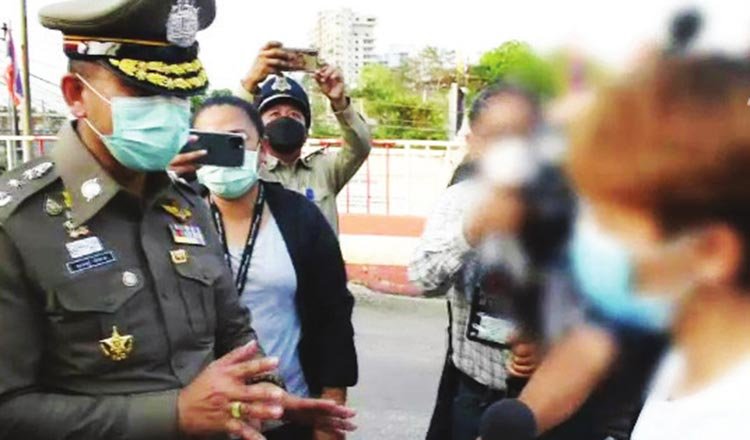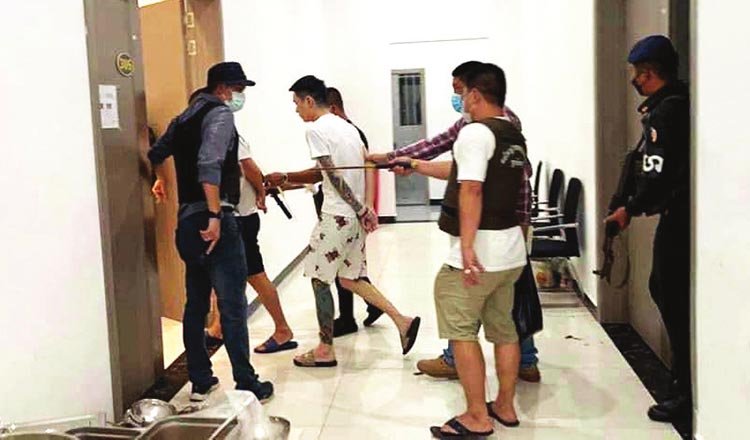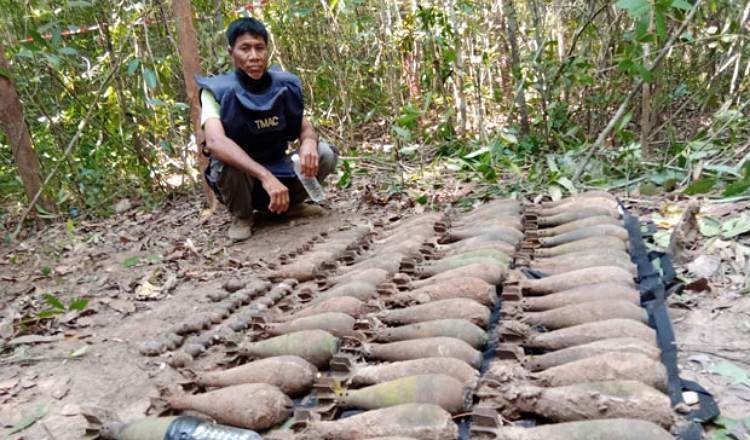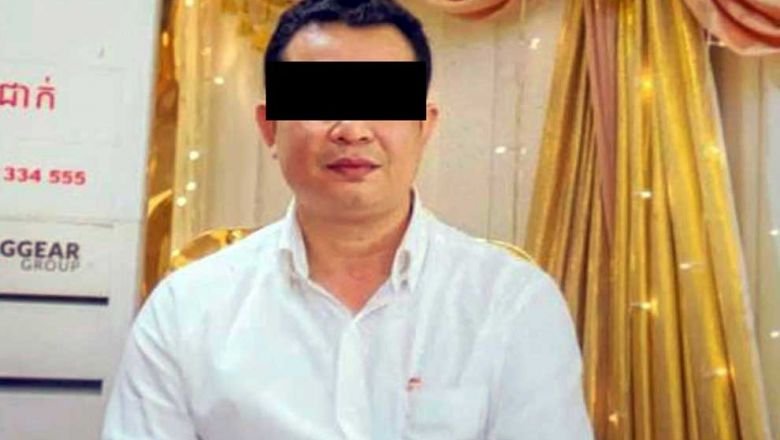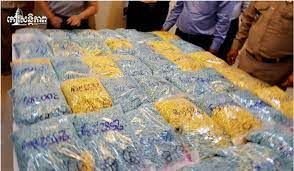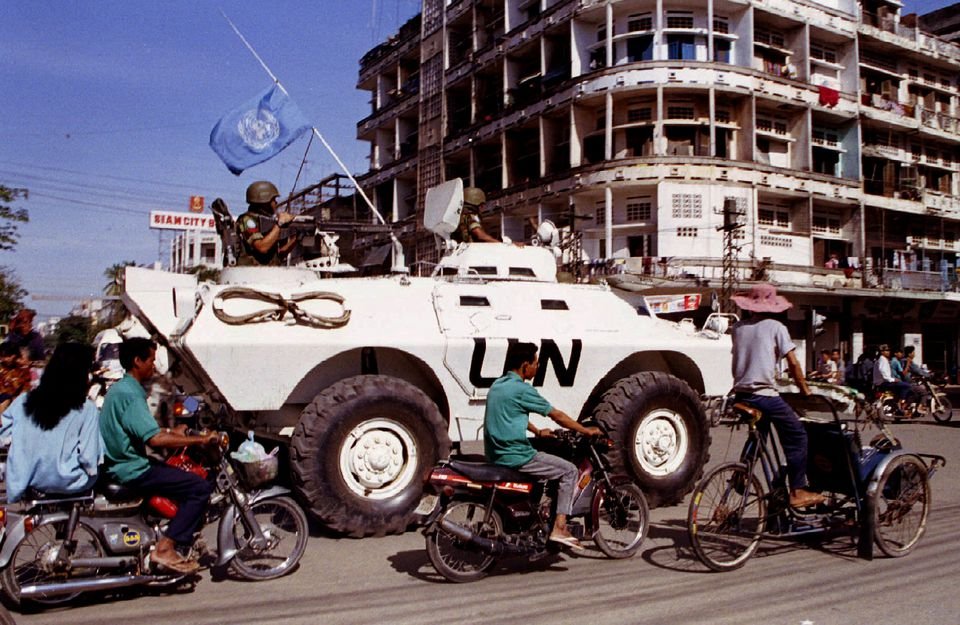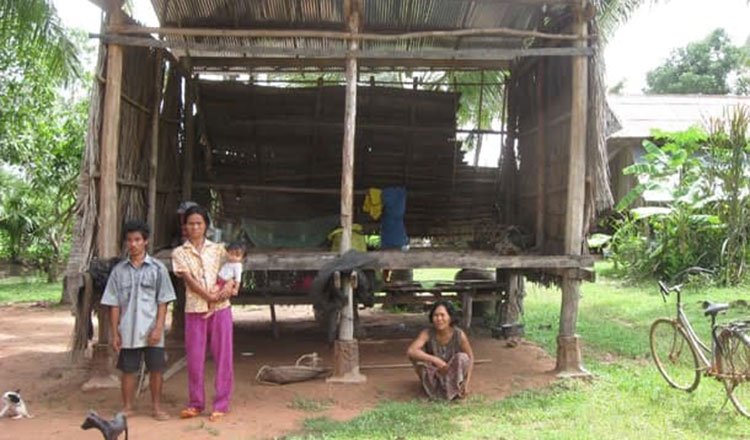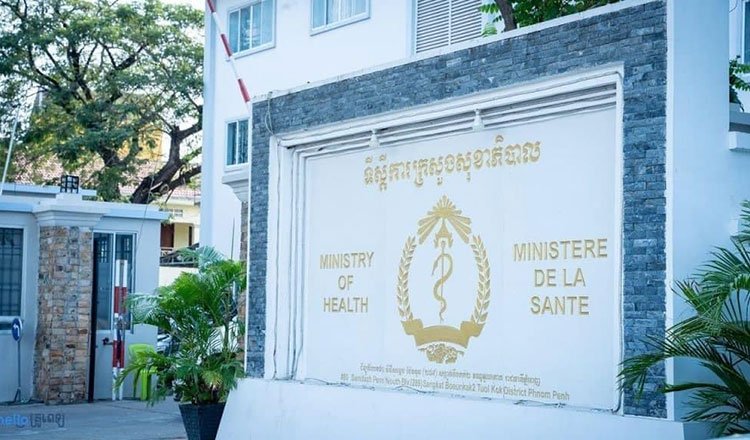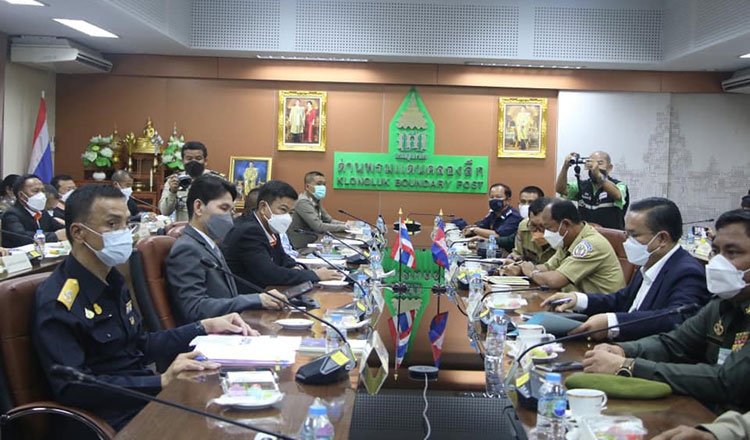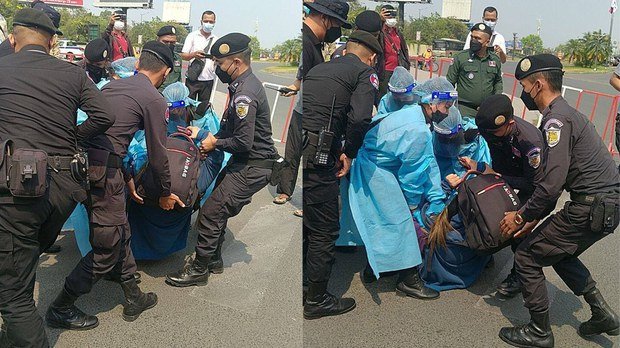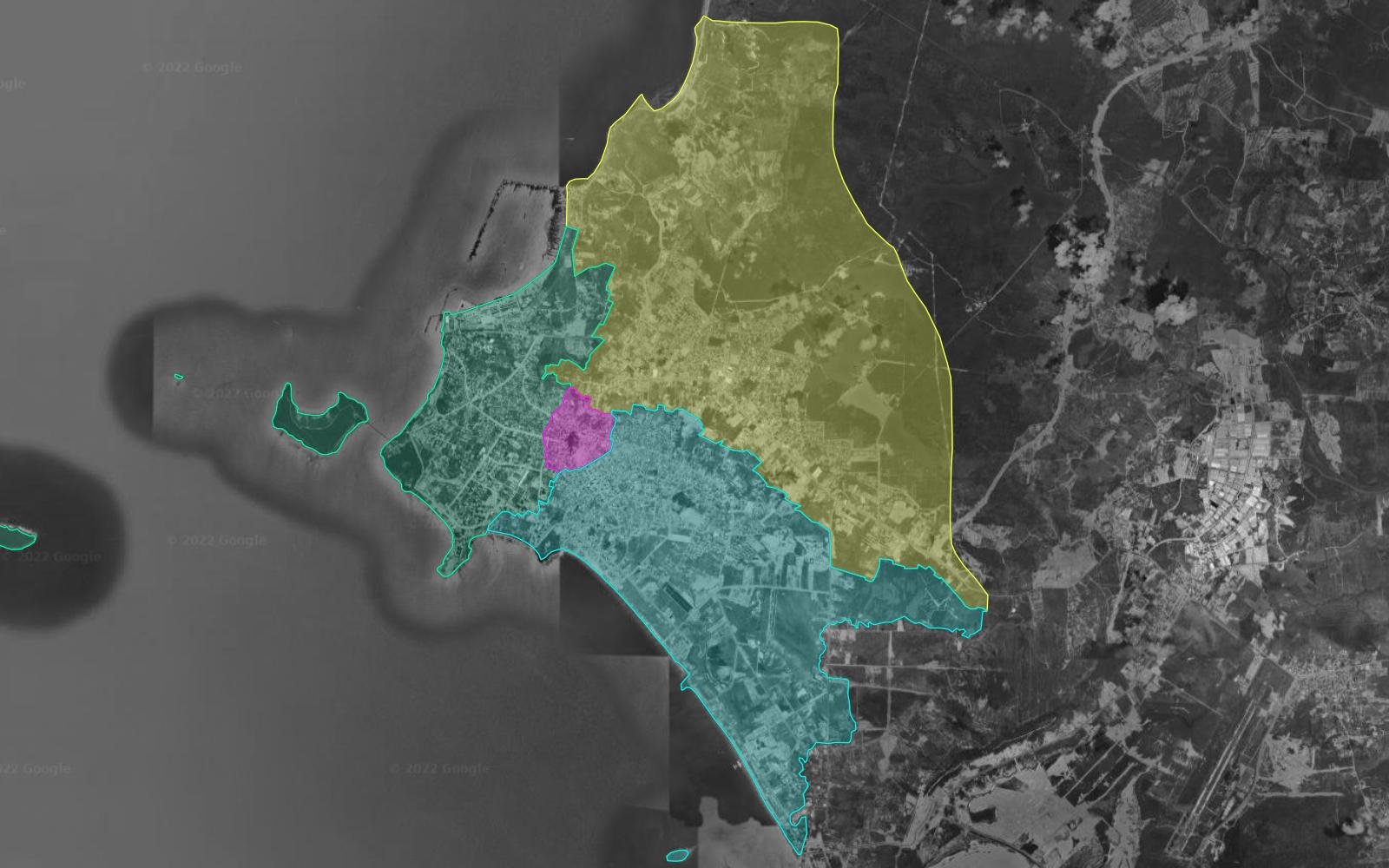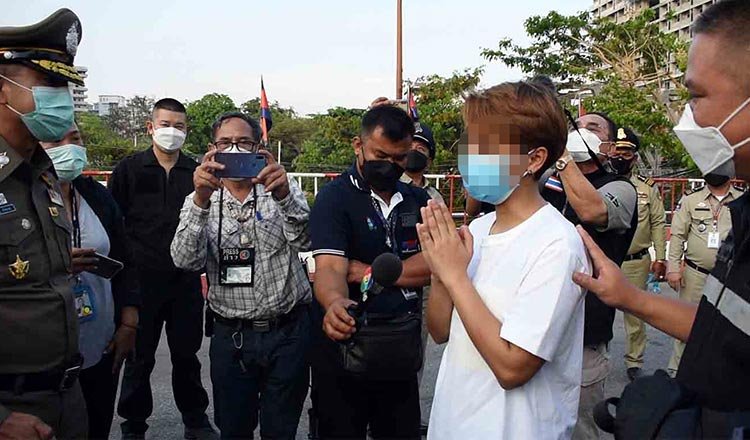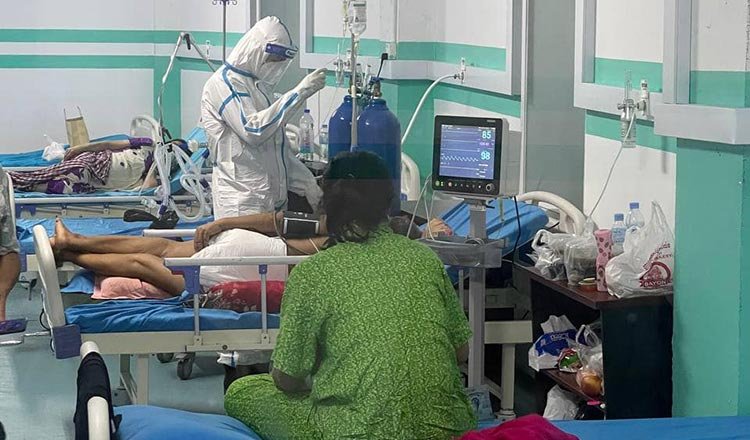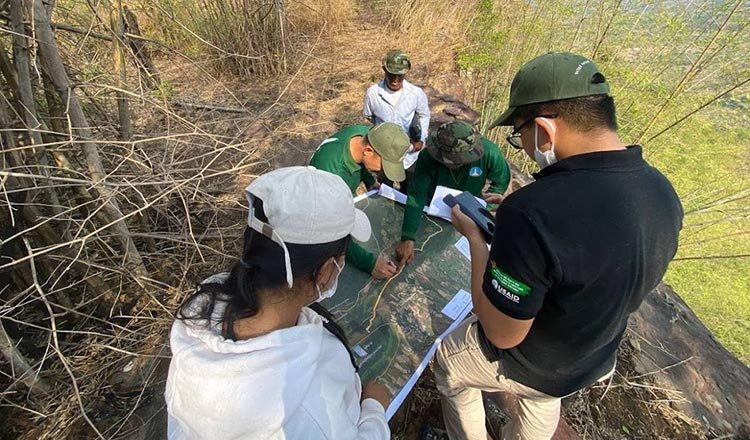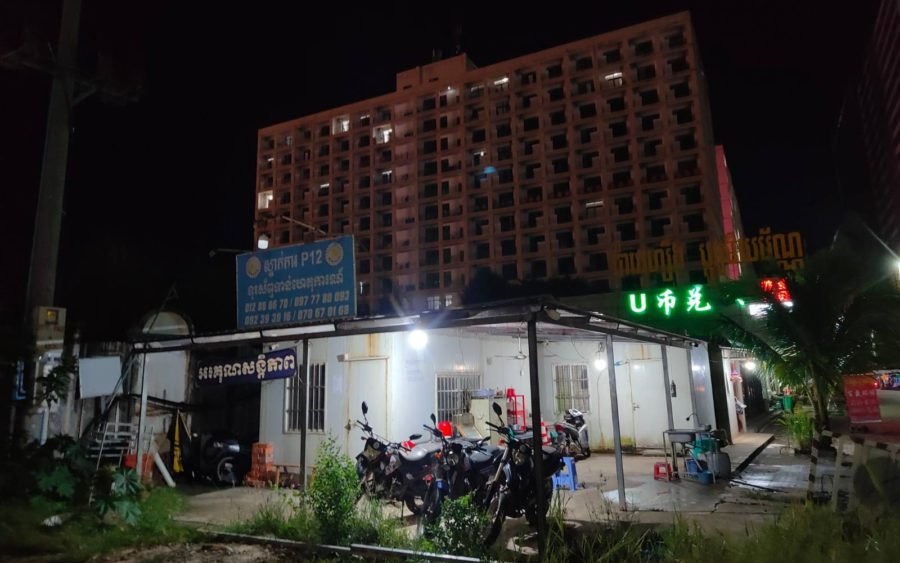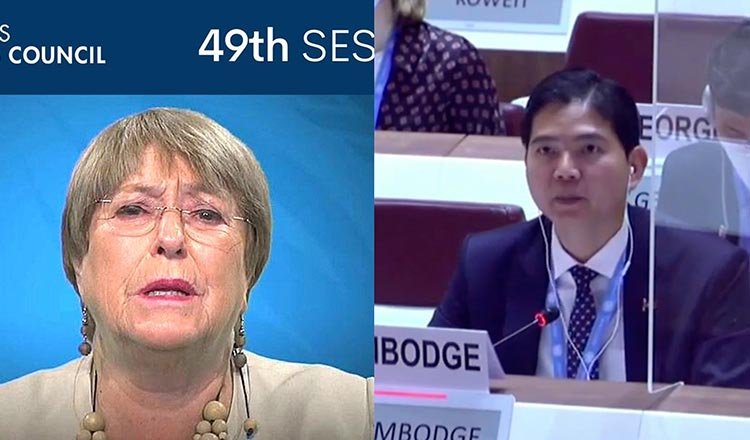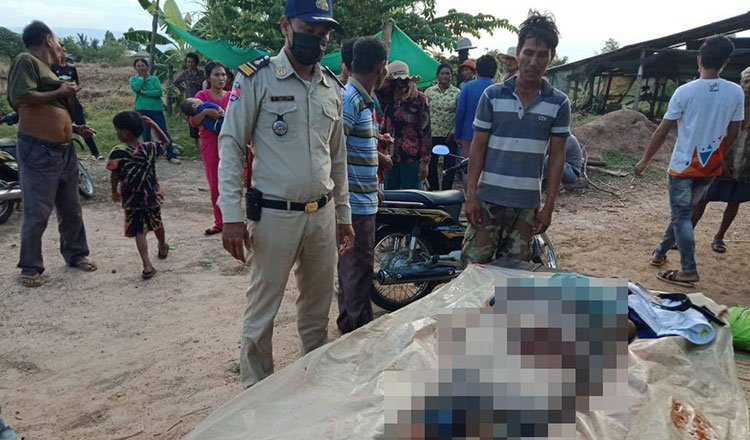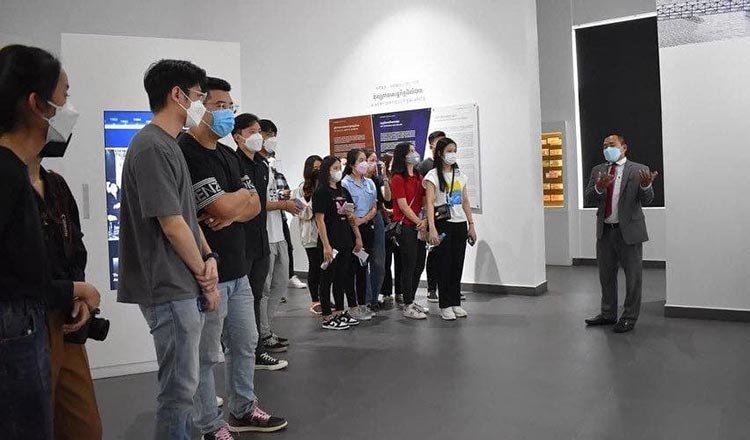-
Posts
15,427 -
Joined
-
Last visited
Content Type
Forums
Downloads
Quizzes
Everything posted by geovalin
-
A plan to clean up the Mekong river and its banks, in a “clean-up campaign” will use Germany’s new technology’s “Moringa by Landmarken” garbage collection boat, which is capable of quickly collecting location data on landfills via drones and cameras, and has the ability to collect up to 20 tons of submerged litter per day. Clemens Nepomuk Feigl expressed his eagerness to launch the campaign and have the opportunity to present this historic river cleanup campaign. The campaign will use CollectiX boats to collect garbage from the water and there will be garbage collection along the river from March to June 2022. The collected waste will be distributed at the landfill in Phnom Penh organized by everwave and River Ocean Cleanup, and the non-recyclable waste will be sent to Chip Mong Ecocycle to be converted into energy in the cement factory. read more https://www.khmertimeskh.com/501041353/clean-up-of-the-mekong-river-using-new-technology-boats-to-collect-garbage-to-commence/
-
With the Khmer New Year drawing near, there is a lot migrant worker movement in some provinces bordering with neighbouring countries such as Thailand. This is causing serious concern to the provincial authorities as they are also seeing an increase in Covid-19 cases which if not handled and managed properly will lead to another community outbreak. Since early this month, more than 1,300 migrant workers have started returning to Banteay Meanchey while another more than 1,000 to 1,500 to Oddar Meanchey from Thailand. Banteay Meanchey deputy governor Ngor Mengchroun yesterday said that the increase in migrant workers returning for the Khmer New Year celebration is very noticeable. In the first two months of this year, he added that not more than 200 migrant workers would have crossed the border from Thailand and with the celebration a month away, many are scheduled to return and managing the influx of migrant workers will be a challenge for the relevant officials.
-
Phnom Penh Municipal Court yesterday handed down life sentences to three Chinese men after they were found guilty of trafficking more than 1.5 kilogrammes of drugs in the capital. Presiding Judge Say Sreyleak identified them as Shi Bel, 51, Huo Tao, 24 and Ba Yun, 24. They all were tourists. “The court decided to sentence each of them to a life imprisonment. They are ordered to pay about $25,000 each to put in the state’s budget,” Judge Sreyleak read the verdict. She said that the trio was charged with “drug possession, transporting and trafficking” under Article 40 of the Law on Drugs Control. They were arrested on October 18, 2020 by the police at the Ministry of Interior, she added. The trio was apprehended after the police raided their rental house in Toek Thla commune in the capital’s Sen Sok district, she said. read more https://www.khmertimeskh.com/501041365/three-chinese-men-jailed-for-life-over-drug-trafficking/
-
Nearly 200 Afghan asylum seekers are in Cambodia after the government agreed to accept them on humanitarian grounds. According to the Department of Immigration Task Force spokesman Major General Chung Ravuth, the Cambodian government has agreed to accept 300 Afghan asylum seekers. He said 200 of them have arrived and they are preparing to go to a third country. He added that the asylum seekers came in the last few months in batches of up to 12 people and they are staying in Phnom Penh temporarily before traveling to a third country. They were received on Humanitarian grounds as per the government decision, said Ravuth. He added the government will look into the welfare, safety and needs of the refugees while in Cambodia and make sure they are comfortable during their temporary stay. “We welcome the refugees as decided by the government in August,” said Maj Gen Ravuth. Interior Ministry spokesman General Khieu Sopheak said, “The government is ready to receive those refugees. It’s like we used to receive Rohingya refugees.” read more https://www.khmertimeskh.com/501041364/nearly-200-transiting-afghan-refugees-in-cambodia/
-
One expert noted that as many as 40% of detainees were awaiting trial. Cambodia’s vastly overcrowded prisons may violate international laws against cruel and inhuman punishment, as inmates lack sufficient sleeping spaces and access to clean water and fresh air, according to the United Nations Human Rights Committee. The committee met on March 11 in Geneva, Switzerland, to discuss a report on how Cambodia implements the provisions of the International Covenant on Civil and Political Rights and to hear responses from Cambodian officials. The body of independent experts monitors implementation of the multilateral treaty. Governments must submit regular reports on how civil and political rights of individuals — including the right to life, freedom of religion, freedom of speech, freedom of assembly, electoral rights, and rights to due process and a fair trial — are being implemented. Cambodia’s prison population has doubled since 2015, with 38,977 inmates in facilities that can hold up to 8,804, meaning that the prisons are operating at 343% capacity, said the report issued in September 2021. The report covers the period from June 1, 2020, to May 31, 2021. “The situation in prisons is perilous to the point that the conditions may constitute cruel, inhuman or degrading treatment or punishment under the Convention against Torture and Other Cruel, Inhuman or Degrading Treatment or Punishment given the levels of mental and physical pain experienced by prisoners, the lack of sleeping space, the inadequacy of the water and sanitation, and the limited access to fresh air and health care,” the report said. The document also referred to allegations of several suspicious deaths of Cambodians while they were in custody, many of which were neither reported nor investigated. The Cambodian delegation at Friday’s meeting included representatives of the Cambodia Human Rights Committee, Ministry of Labor and Vocational Training, Ministry of Information, Ministry of Women Affairs, Ministry of Interior, and the Permanent Mission of Cambodia to the United Nations Office at Geneva. Chin Malin, secretary of state of Cambodia’s Justice Ministry, said his country has worked hard to resolve the issue of overcrowded prisons, including by reducing a backlog of court cases, suspending sentences and releasing some Cambodians held in pretrial detention. Authorities use pretrial detention — which for serious felonies can last for 24 months — because of a lack of legal personnel and the case backlog, Cambodian officials said. Authorities have released detainees who committed minor offenses, expedited vaccinations and limited visitations to prevent the spread of the COVID-19 virus within prisons, the officials said. But a committee expert cited data suggesting that the average prison occupancy in 2020 was beyond 300% of capacity, with overuse of incarceration as one of the underlying causes. The expert, whose name was not given in a U.N. summary of the meeting, requested more information on what Cambodia was doing to reduce prison overcrowding. The expert also noted that 30-40% of all detainees were awaiting trials and that there had been frequent allegations that their due process rights were being disregarded. The person wanted to know if Cambodian officials had developed guidelines for judges to use in their decisions on pretrial detention. Water shortages Another committee expert asked for more information on the number of deaths in prisons from epidemiological outbreaks, the availability and access to COVID-19 testing, and the rate at which detainees have been vaccinated. Experts also raised questions about people who suffered from drug addiction being detained and forced to undergo medical treatment under Cambodian law and reports of homeless people detained against their will in the Cambodian capital Phnom Penh. Cambodian officials said the General Department of Prisons was investigating cases of torture and that the government was reviewing its laws to try to prevent the practice. Some officials who have been identified as torturing inmates have been charged and placed in pretrial detention, the delegation said. Nuth Savana, spokesman for the Ministry of Interior’s General Department of Prisons, told RFA that the prison overcrowding has been reduced since last year. The department reported a decrease of 2,000 prisoners this year from the nearly 39,000 inmates that were behind bars in 2021. Nuth Savana said his department was also working to address the problem of water shortages in detention facilities, saying that more wells are being dug at prisons. “[Concerning] prisons that face the problem, we are working with the International Committee of the Red Cross to create filtered water systems, such as in Preah Vihear, Oddar Meanchey and Siem Reap provinces,” he said. “We’ve dug more wells.” Prisons in Kampong Cham and Kampong Chhnang provinces have filtered water system installed, he said. “We have prioritized the lack of water first,” Nuth Savana said. “As I said, the problem of water shortages is an old report.” Ny Sokha, a human rights defender and president of the Cambodian Human Rights and Development Association, said overcrowding continues to be a problem because the government has not paid much attention to it. The situation is still serious enough that it affects the detainees physically and psychologically, he said. Ny Sokha, who was himself a prisoner of conscience, also said the congestion could be due to an increase in the number of drug users who have been incarcerated. “If we cannot solve the problem of overcrowded prisons, it can affect prisoners’ health and their mental state, so that when they are released, they cannot be good human resources,” he said. “They become sick and suffer from debilitating diseases, so it’s not good for them or for our society.” The U.N. Human Rights Committee is scheduled to hold another public meeting on Friday and plans to issue its concluding observations and recommendations on Cambodia by March 25. Reported by RFA’s Khmer Service. Translated by Sok Ry Sum. Written in English by Roseanne Gerin. https://www.rfa.org/english/news/cambodia/human-rights-committee-03142022191656.html Copyright © 1998-2020, RFA. Used with the permission of Radio Free Asia, 2025 M St. NW, Suite 300, Washington DC 20036.
-
In the latest of implausible tales, both the Foreign Affairs Ministry and Preah Sihanouk Provincial police chief yesterday dismissed the “organ harvesting gang” story given by the so-called victim to Thai police, claiming that it was staged to gain sympathy. First reported by Thailand- based news website The Thai Examiner, a 25-year-old Thai woman, whose identity has not been disclosed, told Thai police that she almost fell victim to a Chinese organ harvesting ring in Cambodia after being tricked into working illegally. One of the eight Thai illegal immigrants who were deported from Cambodia and received by the Thai police on Wednesday at Sa Kaeo province, the woman reportedly said she was forced by the scammer to work for a “Chinese-operating call centre”, and when she refused to work, she was confined without food and even tortured. read more https://www.khmertimeskh.com/501040609/authorities-dismiss-thai-womans-organ-harvesting-allegation/
-
The recent rise in crimes committed by Chinese syndicates, from online gambling and job scams to human trafficking and abduction, is threatening the safety of people of all nationalities in the Kingdom. Many are disguising themselves as private companies operating online services in investment zones. Most of these crimes are taking place in Preah Sihanouk’s Sihanoukville which is popular among Chinese investors and visitors. From 2016 to 2018, Sihanoukville saw a large influx of Chinese investors and workers in Cambodia, thanks to a real estate boom. With them came gangs which operated online gambling outlets leading to debts, mainly among their own nationals, resulting in a rise of crimes such as abduction and extortion of gamblers. There was also a surge in telecom fraud, or Voice over Internet Protocol scams, involving Chinese gangsters preying on their own countrymen. In the first eight months in 2019 alone, nearly 1,000 Chinese nationals had been arrested by the police, including 115 suspected of telecom fraud and 335 suspected of participating in illegal online gambling operations. read more https://www.khmertimeskh.com/501040604/unwelcome-investors-rise-in-crimes-by-chinese-gangs-threaten-safety-of-all-nationalities/
-
A large quantity of wartime munitions were found in a forest near the Thai-Cambodian border in Sangkha district of this lower northeastern province on Saturday. The munitions were discovered by villagers from Ban Kalengwek, Moo 2 village in tambon Thepraksa of Sangkha district, while looking for wild products in a forest about four kilometres from the village near the border with Cambodia. The villagers informed Chai Prom-uk, the village chief, who subsequently contacted the Thai Mine Action Centre (TMAC) of the Royal Thai Armed Forces at the Huay Khanad Mon reservoir in Sangkha district.Troops from the centre were dispatched to the scene for examination. They found at the spot 51 rounds of ammunition for 82mm recoilless rifles, nine rounds of ammunition for 75mm recoilless refiles and 30 M26 hand grenades. The munitions were still in working condition. The soldiers from the TMAC said a large number of mines had been buried in forests along the Thai-Cambodian border in the adjoining area of Bua Chet and Sangkha district of Surin province, a battlefield of former Khmer warring factions. read more https://www.khmertimeskh.com/501040678/huge-arms-cache-found-on-thai-border-with-cambodia/
-
Police in Phnom Penh’s Tuol Kork district have launched an investigation into a domestic violence case involving a court official on the night of March 12 in Teuk La’ak II commune. Citing the plaintiff’s complaint, district police chief Sok Heng identified the accused as municipal court deputy prosecutor Muth Dara. The plaintiff alleged that her estranged husband Dara beat her violently along with a housemaid and also threatened to shoot them with a gun. She said she has been married to Dara for 13 years and has one son and two daughters with him. read more https://www.phnompenhpost.com/national/capital-court-deputy-prosecutor-accused-violence-gun-threats
-
PHNOM PENH, March 12 (Xinhua) -- Cambodia's anti-drug police have arrested an American national and his Cambodian accomplice for allegedly trafficking almost 43 kg of drug, the National Police reported on Saturday. The duo, a 33-year-old U.S. man and a 29-year-old Cambodian man, were caught on March 6 at two locations in capital Phnom Penh. "A total of 42.7 kilograms of crystal methamphetamine (ice) was confiscated from them during the raids," the National Police said on its website. The southeast Asian nation has no death sentence for drug traffickers. Under its law, someone found guilty of trafficking over 80 grams of illicit drugs could be imprisoned for life. According to the kingdom's Anti-Drug Police Department (ADP), in 2021, the authorities nabbed a total of 13,765 drug suspects in 6,242 cases throughout the country, seizing 4.43 tons of illicit drugs, mostly ice, heroin, and ecstasy. http://www.news.cn/english/20220312/da63ec586dca4153b1b3992f50a3b43f/c.html
-
PHNOM PENH, March 13 (Reuters) - Just over 30 years ago, a crackling radio in a refugee camp on the Thai border brought Sam Sophal word that the United Nations was coming to his war-ravaged homeland of Cambodia. For Sam Sophal, who survived the Khmer Rouge genocide only because his mother bribed Khmer Rouge executioners with her silver watch, the promise of peace was irresistible. The U.N. Transitional Authority in Cambodia (UNTAC) arrived on March 15, 1992, with great expectations, the first U.N. nation-building operation after the collapse of the Soviet Union sparked hope that democracy would flourish around the world. But long before last year's shambolic fall of Afghanistan and the costly international missions in Iraq, Kosovo and elsewhere, Cambodia would serve as an early warning of the flaws and limitations of nation building. At the time, UNTAC was the most ambitious and expensive U.N. mission but despite its $1.6 billion cost and $20 billion in subsequent international aid, hopes of creating a vibrant democracy faded long ago. "I felt very proud during the UNTAC time because I was the first generation to bring peace to Cambodia," says Sam Sophal, 60, who got a job as a translator with the mission soon after its launch. "Now I see we have gone backwards. To one-party rule," he said under the shade of a Jujube tree in his Phnom Penh backyard. Prime Minister Hun Sen, the same man in power before the UNTAC mission, remains leader, presiding over what critics call an authoritarian government with most opposition leaders in exile or in jail. Government spokesman Phay Siphan rejects accusations that Hun Sen is an autocrat, saying he has worked for peace and democracy since 1979. The United Nations said in a statement UNTAC's original mandate of "restoring to the Cambodian people and their democratically elected leaders their primary responsibility for peace, stability, national reconciliation and reconstruction had been fulfilled". BLUE SKY A prophecy that foretold of a "god with blue eyes" that would one day bless and restore the land had spread through villages during Cambodia's darkest years. So when UNTAC arrived with their sky-blue flag and helmets they were seen as an incarnation of that deity, some even painting their homes a U.N. shade of blue, recalled Youk Chhang, executive director of the Documentation Center of Cambodia. "Conflict, genocide, invasions, refugees ... and then suddenly there was blue sky," he said. A former French colony, by the early 1990s Cambodia had endured decades of devastation after getting sucked into the Vietnam War. During the four-year Khmer Rouge "killing fields" regime an estimated 1.7 million people, about a fifth of the population, perished. A Vietnamese invasion toppled the Khmer Rouge in 1979, setting off a war in which the ousted Maoists and two other factions battled the invaders and their Cambodian allies. UNTAC's main triumphs were bringing hundreds of thousands of refugees home from border camps in time for the May 1993 election, when almost 90% of voters turned out. "For the first time we felt very free," said Youk Chhang, who spent two weeks in an electoral office guarding ballots. "It was a beautiful feeling." But Hun Sen, prime minister before UNTAC, came second and quickly complained of vote-rigging. The polls, he said, were worse than the pain of losing an eye in battle. Threatening to break up the country, Hun Sen forced a power-sharing deal that saw the man who had won the vote, Prince Norodom Ranariddh, and Hun Sen taking the roles of first and second prime ministers. "In the world there is no such thing as two prime ministers," said Sam Sophal, still bemused by the arrangement. "Think about one car and two drivers, who is going to take over?" The coalition eventually disintegrated in bloodshed, with armed forces loyal to Hun Sen ousting Ranariddh in a 1997 coup. 'OUT OF THEIR MINDS' In retrospect, UNTAC was criticised for caving in to Hun Sen and then just leaving in September 1993. But even at the time, many say it was evident its mandate was fanciful. "The people who planned it were out of their minds. It was definitely a mission impossible," says academic and author Craig Etcheson. "To expect all these people to parachute into a destroyed country, an alien culture with no language skills and to accomplish anything was pretty crazy." UNTAC's goal of democracy was always complicated by Hun Sen ambition. "He was so far from being a democrat that you knew it wasn’t likely to end well," recalled Tim Carney, who ran UNTAC's information division. He now describes Hun Sen as a "dictator". Hun Sen is one of the world's longest serving leaders and presides over a single-party parliament. In 2017, a court dissolved the main opposition party while a feisty media that blossomed under UNTAC was tamed. Since the great Cambodian experiment, democracy has been in retreat around the world. According to the Bertelsmann Transformation Index, for the first time since 2004, there are more autocratic states than democracies. Like many U.N. missions, expectations in Cambodia were improbably high, said ex-military observer J Floyd Carter, who was detained by the Khmer Rouge during his UNTAC posting. "Having been in Cambodia and then in Bosnia, Serbia, Kosovo, Haiti, there were similar disappointments ... It achieves 55% of what it sets out to do," Carter said of the United Nations. Carney said the United Nations was more realistic these days. Following last year's coup in South Sudan, it prioritised dialogue rather than democratic masterplans. "They are just trying to get a conversation started," he said. "Which in my mind is about the most that foreigners can do." When UNTAC was wound up, it left Cambodia with a fraught political arrangement that was almost bound to go awry. "UNTAC was the first test," says Sam Sophal, "But they didn't complete the mission." Now retired after 24 years with the United Nations, Sam Sophal says corruption and nepotism have left Cambodians with no political alternatives. "People in this country believe in democracy and human rights but who is going to lead them?" he asked. Reporting by Kate Lamb; Editing by Kay Johnson and Robert Birsel
-
The United Nations Children’s Fund (UNICEF) in Cambodia said on Friday that 77 percent of households with children have experienced loss of income since the COVID-19 pandemic started. In its press statement, the UN agency said that it, together with the World Food Program and the Asian Development Bank, has conducted regular COVID-19 Socio-Economic Surveys throughout the pandemic to monitor its impact on vulnerable households. The results confirmed that Cambodian households with children were more likely to lose income than households without children, said the statement. It said “77 percent of households with children experienced loss of income, compared to 69 percent of households without children,” adding “Similarly, 69 percent of households with children resorted to at least one negative food-based coping strategy during the pandemic, such as reducing food portions or choosing less healthy ingredients.” Foroogh Foyouzat, UNICEF’s representative in Cambodia, said the study demonstrated that children have faced the greatest hardships as a result of the pandemic. “The Royal Government of Cambodia’s notable efforts to combat the pandemic and to alleviate its negative impacts through the introduction of comprehensive social protection have certainly cushioned the harm caused to children, but haven’t eliminated it,” she said. read more https://www.khmertimeskh.com/501040250/unicef-says-77-percent-of-cambodian-households-with-children-experience-loss-of-income/
-
The CDC Department of Infectious Diseases (CDC) has announced that A/H9 (Influenza A/H9) bird flu has been transmitted to a one-year-old baby with symptoms of fever, cough and shortness of breath, and has been treated at the Angkor Children’s Hospital in Siem Reap City. The CDC confirmed that the infant lived in Trapeang Run village in Siem Reap province. “We found cases of bird flu A / H9 in humans through the Ministry of Health’s pneumonia monitoring system,” the CDC said. It added that the ministry officials had found dead chickens in the village in February, which tested positive for Influenza A/H9. The Ministry immediately sent officials from the department of infectious diseases to cooperate with the provincial emergency response team to investigate, prevent and control the spread of the virus. read more https://www.khmertimeskh.com/501040197/infant-infected-with-bird-flu-sparks-alert/
-
Provincial authorities of Banteay Meanchey and Sa Kaeo, Thailand met to strengthen information cooperation and review the feasibility of the temporary opening of the Stung Bot International Border Crossing. The meeting was chaired by Banteay Meanchey Governor Um Reatrey and Sa Kaeo Governor Parinya Phothisat at the shared border crossing on the afternoon of March 10. Governor Reatrey said that the delegation and relevant authorities, including the Cambodian Consul General met with the Thai delegation led by Governor Parinya at the invitation of the Thai Governor. They met to discuss the temporary opening of the Stung Bot Border Crossing to facilitate the transport of goods. The construction of the Office of Labour Administration of the two countries is ongoing at the border crossing location. Governor Reatrey that despite the Cambodian office being only 40 percent completed and the Thai office being 90 percent completed, the delegations met to review the progress and the possibility of holding talks to temporarily open the border crossing for entry and exit. read more https://www.khmertimeskh.com/501040050/banteay-meanchey-sa-kaeo-provincial-authorities-discuss-temporary-opening-of-stung-bot-international-border-crossing/
-
Arrested workers say that authorities are trying to ‘torture them’ do discourage further protests. Authorities in the Cambodian capital Phnom Penh again detained more than 100 striking NagaWorld Casino workers Friday, in the latest in a series of brutal mass arrests since the strike started more than three months ago. Some of the 158 strikers who were detained this time told RFA’s Khmer Service that they were forced into buses and taken to a quarantine facility on the outskirts of town but were not allowed to leave the buses for several hours, enduring extreme heat until the point that some of them began to vomit. “It was awful. We are just workers. They used such brutal measures. The authorities pushed me into a truck and my arm was injured when they detained me,” Pov Raksmey told RFA. Lay Sopheaktra, another detained worker, told RFA that she felt the authorities wanted to torture the workers so that they would not dare to gather for more protests. “I am very sad that we are protesting for our jobs, but the authorities are denying our rights and assaulting us,” she said. Thousands of NagaWorld workers walked off their jobs in mid-December, demanding higher wages and the reinstatement of eight jailed union leaders, three other jailed workers and 365 others they say were unjustly fired from the hotel and casino, which is owned by a Hong Kong-based company believed to have connections to family members of Cambodian Prime Minister Hun Sen. Cambodian authorities have called the strike “illegal” and alleged that it is supported by foreign donors as a plot to topple the government. But a series of mass arrests in recent weeks have been attributed to alleged violations of pandemic health regulations in Cambodia’s capital. Activists said the charges were trumped up to break up the strike. RFA reported Wednesday that 147 of the fired workers accepted compensation, but the remaining strikers are still calling for their union leaders to be released and for the company to negotiate with them. RFA attempted to reach Phnom Penh Municipal Police spokesman San Sok Seiha for comment about Friday’s arrests, but he was not available. Video footage of authorities in Phnom Penh arresting striking NagaWorld workers Friday. A Cambodian labor advocacy group told RFA that the authorities have used similar tactics to break up peaceful protests. “The authorities and NagaWorld Casino need to seek a solution. If they continue violence, the crisis will be deepened,” said Khun Tharo, the labor program manager for Center for Alliance of Labor and Human Rights He urged the Ministry of Labor to intervene the release of 11 union leaders and workers who are being jailed to allow the workers and the NagaWorld to resume talks. The workers arrested Friday said authorities released them from the quarantine center after detaining them without medical attentions for a few hours. They said they will continue their fight if there is no solution. RFA reported Tuesday that Cambodia’s Minister of Interior Sar Kheng was planning to lead a meeting of governmental officials on Wednesday to resolve the dispute. Also on Wednesday, Phnom Penh authorities released around 200 strikers detained a day earlier while they were protesting. On Thursday, an appeals court denied bail to the eight union leaders on the grounds that their case is still under investigation by the Phnom Penh Municipal Court. Translated by Samean Yun. Written in English by Eugene Whong. https://www.rfa.org/english/news/cambodia/nagaworld-03112022154021.html Copyright © 1998-2020, RFA. Used with the permission of Radio Free Asia, 2025 M St. NW, Suite 300, Washington DC 20036.
-
Murders, kidnappings, corpses on the beach — news reports out of Sihanoukville paint a picture of violent and serious crime in the coastal city. But authorities are increasingly shutting down information about police work and pressuring journalists over negative stories, crime reporters say. A sampling of local crime reports emerging from the city over the past two years include at least six reported cases of bodies found either in public locations or washed up along the beach; 19 homicides, assaults or firearms cases; 11 cases of extortion and detention; and some other serious crimes. VOD reviewed 14 cases in 2020 and 26 cases in 2021, and more than half of these cases were clustered in Sihanoukville’s Buon commune. Many happened at common locations: along O’Tres and O’Chheuteal beaches; a borey called Pearl of Asia in Bei commune; a compound called “Ksach Meas,” or Golden Sand, in Buon commune; and the same commune’s notorious “Chinatown” complex. read more https://vodenglish.news/crimes-in-shadows-sihanoukvilles-grisly-reports-pressure-on-journalists/
-
In the latest saga involving a foreigner claiming to be a victim of criminals, Cambodian police are now investigating a scenario described by a Thai woman who says she fell victim to an organ trading gang after being tricked into coming to the Kingdom to work for a Chinese company. As reported first by the media in Thailand, the 25-year-old woman was among a group of eight Thai nationals sent back to Thailand after being caught working illegally in Cambodia. They were received by Thai Police on Wednesday at Thailand’s Sa Kaeo province. Recounting her account to the Royal Thai police officers, she said that upon her arrival in Preah Sihanouk province’s Sihanoukville, she was told to work for Chinese-operated call centre, and her refusal to do so led to her being “assaulted, detained and left to starve”. The scammers told her that in exchange for her freedom, she needed to contact her family in Thailand to pay them, she claimed. read more https://www.khmertimeskh.com/501039492/crying-wolf-deported-thai-worker-claims-gang-wanted-to-harvest-her-organs/
-
It was on this date a year ago when the deadly Covid-19 claimed the first life in Cambodia, and ever since the number of fatalities rose to 3,044. A year may have passed but almost all the families still mourn the loss of their loved ones to the deadly virus over this one year period. Recollecting March 11 last year, the painful and tragic demise of the first Covid-19 victim who was treated at the Khmer-Soviet Friendship Hospital was announced by the Ministry of Health. Lao Vanna, 50, a driver, who lived in Phnom Penh’s Meanchey district and diagnosed with Covid-19 on February 27 succumbed to the disease about 10.40am. The death was linked to the February 20 Community Event when two out of four Chinese nationals who breached quarantine at the Sokha Hotel few days prior had tested positive. They were said to have spent time in a nightclub and at several other residences including those in Koh Pich. March 11, 2021 will mark a sad milestone for Cambodia and its people and the February 20 community event was ordered closed by Prime Minister Hun Sen on December 20 when the death rate stood at 3,015. The deaths due to Covid-19 has reduced tremendously, but still being reported due to the rapid spread of Omicron which was first imported by a foreigner on December 14 and local transmission detected on January 8. read more https://www.khmertimeskh.com/501039490/from-the-first-covid-19-death-one-year-ago-today-toll-now-stands-at-a-mostly-unvaccinated-3044/
-
Survivors of the Khmer Rouge period are among the most vulnerable people in Cambodia because of their health conditions, disabilities, poor education and socio-economic status compared to the rest of the country. To improve the welfare of these survivors, Documentation Center of Cambodia (DC-Cam) has initiated targeted interventions that raise public health awareness and access to public health services for them. DC-Cam’s project has three lines of effort. First, it will conduct field research on survivor welfare conditions, particularly in remote communities. Second, the project will conduct activities that improve the health, welfare, and wellbeing of survivors. Activities will include basic education on preventative health and hygiene, and improved access to health care facilities as well as opportunities for socialising and connecting with other survivors and the disabled for improved wellbeing. Finally, the project will conduct activities that translate the information and research of DC-Cam’s work into public awareness. DC-Cam is a ‘grassroots’-focused organisation because most Cambodians live in provincial and rural (rather than urban) environments, and grassroots actions correspond to, and enable, the empowerment of marginalised people, which is the essence of ‘democracy in-action.’ read more https://www.khmertimeskh.com/501039601/improving-the-lives-of-khmer-rouge-survivors/
-
Unionists’ lawyer vows to appeal to the country’s supreme court. Workers from the NagaWorld Casino hold a banner demanding the release of eight representatives detained by authorities during a demonstration in Phnom Penh, Cambodia, Jan. 26, 2022. An appeals court in Cambodia Thursday denied bail to eight union leaders from the NagaWorld Casino strike, on the grounds that their case is still under investigation by the Phnom Penh Municipal Court. Thousands of NagaWorld workers walked off their jobs in mid-December, demanding higher wages and the reinstatement of the eight jailed union leaders, three other jailed workers and 365 others they say were unjustly fired from the hotel and casino, which is owned by a Hong Kong-based company believed to have connections to family members of Cambodian Prime Minister Hun Sen. Cambodian authorities have called the strike “illegal” and alleged that it is supported by foreign donors as a plot to topple the government. But a series of mass arrests in recent weeks have been attributed to alleged violations of pandemic health regulations in Cambodia’s capital. Activists said the charges were trumped up to break up the strike. On Thursday, the appellate court’s presiding Judge Khun Leang Meang decided to uphold the municipal court’s decision to keep the eight union leaders detained at Prey Sar prison until their trials. He read the decision in front of the eight leaders at the court, which did not allow NGOs to monitor the hearing. They were then taken back to the prison. Both courts ignored requests of the accused, and continuing to detain them is unnecessary, their lawyer Sam Chamroeun told RFA’s Khmer Service. “We will examine the court’s decision to find their mistakes and make an appeal in front of the Supreme Court,’ he said. The court’s decision was saddening, Am Sam Ath of the Cambodian League for the Promotion and Defense of Human Rights, a local NGO, told RFA. He said the court failed to take into consideration that the conflict stems from a labor dispute without any solution in sight for over an entire year. The court should have released them because they lawfully expressed their rights through the strike to seek labor solutions and should not be charged and detained, said Am Sam Ath “If they are not released, there will be no solution,” he said. During Monday’s hearing, about 50 workers protested in front of the court. One of the workers told RFA the dispute should be resolved between the union, NagaWorld and the Ministry of labor. “This is a labor dispute so don’t try to provoke us to have problem with authorities,” Sok Ratana said. Through Wednesday, 147 of the 373 laid off workers accepted compensation to end their tenure with NagaWorld, the Ministry of Labor said in a statement Thursday. The statement urged the remaining workers to stop demonstrating so that the ministry can continue to seek solutions. “The ministry urges the ex NagaWorld workers and those who are absent from work to stop making more mistakes that can affect their benefits. The ministry will work with relevant authorities to resolve your concerns while also considering the rights of investors’ rights,” the statement said. It also urged that the workers follow the government’s COVID-19 measures. Translated by Samean Yun. Written in English by Eugene Whong. https://www.rfa.org/english/news/cambodia/nagaworld-03102022180516.html Copyright © 1998-2020, RFA. Used with the permission of Radio Free Asia, 2025 M St. NW, Suite 300, Washington DC 20036.
-
A major intergovernmental response is urgently needed to address a crisis of forced labor, slavery and torture in Cambodia, a collective of 35 civil society groups said on Thursday. Thousands of people are entrapped, often foreign nationals who have been kidnapped, sold, trafficked or tricked into accepting jobs in Cambodia, the groups said in a statement, citing victim accounts and media reports. “Once in Cambodia, they are detained in large compounds and forced to work, often conducting online scam operations targeting foreign nationals outside the country,” their statement said. “Workers who escape report having faced physical and mental threats and violence at the hands of their captors.” The embassies of Indonesia, Vietnam, Thailand, Pakistan and China have issued warnings about the situation, the statement added. “The continued existence of these operations is a tragedy, and we are horrified that Cambodia is being used as a base for such inhumanity. All relevant actors must immediately guarantee that no one is subject to slavery or torture within Cambodia,” the statement said. read more https://vodenglish.news/abolish-slave-compounds-groups-call-for-urgent-investigation-response/
-
The Cambodian Permanent Mission to United Nations in Geneva has maintained that an absence of the court-dissolved Cambodia National Rescue Party (CNRP) for the upcoming elections “does not detract Cambodia from pluralism”, saying the voters remain able to choose one among 17 registered political parties. The statement was made by An Sokkhoeurn, Cambodian Ambassador and Permanent Representative to UN office in Geneva, at the 49th Session of the UN Human Rights Council on “General Debate on Item 2: High Commissioner’s Oral Update” yesterday. In his statement, Sokkhoeurn did not mention any political party by name but seemed to refer to the court-dissolved CNRP after Michelle Bachelet, UN High Commissioner for Human Rights, in her statement said: “The country’s largest opposition party is precluded from running and many of its leaders and supporters are exiled, detained and even facing prosecution for conduct legitimate under international law.” read more https://www.khmertimeskh.com/501038828/voters-have-multiple-parties-to-choose-from-cambodia-tells-un/
-
A 13-year-old was killed yesterday in a landmine explosion in Kas Kralor district’s Prey Toteoung Village of Battambang. The boy, identified as Seung Vansing, was tending his family’s cattle yesterday evening when one of the cows stepped on an anti-vehicle mine. Both the boy and the cow were killed in the incident. A big portion of the land in Battambang , which was a frontline battlefield for over two decades of war, remained covered by landmines, and other UXO, all of which have had deadly consequences for the area’s residents. read more https://www.khmertimeskh.com/501038667/boy-killed-by-landmine-in-battambang/
-
THE younger generation of Cambodia is now starting to have a sense of pride in their national currency, the riel. It is evident through frequent visits from students and youngsters to the Sosoro Museum. Sosoro Museum Co-Director Blaise Kilian told Khmer Times that the museum recently saw young people, including students from schools and colleges, pouring in to learn about their national currency’s history. They have been increasingly using riel instead of appearing “cool” in using the dollar. “It is a gratifying feeling to see the youth to have a sense of pride in the riel, once almost diminished physically and devalued. Thanks to a highly interactive and modern currency museum put together by the National Bank of Cambodia (NBC), we now have young people wanting to learn and know more about their currency and its value to them. read more https://www.khmertimeskh.com/501038827/winds-of-change-in-the-air-as-more-cambodians-take-pride-in-using-riel/
.png.3b3332cc2256ad0edbc2fe9404feeef0.png)


